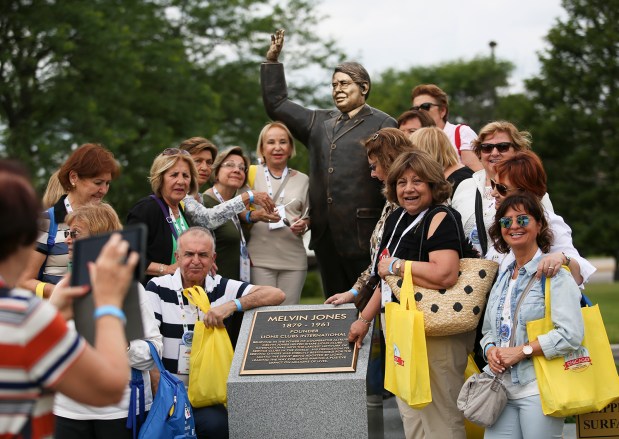NEW YORK — The infamous “Access Hollywood” video in which Donald Trump bragged about grabbing women sexually without asking permission will not be shown to jurors at the former president’s hush-money criminal trial, a New York judge ruled Monday.
Judge Juan M. Merchan said prosecutors can still question witnesses about the tape, which was made public in the final weeks of Trump’s 2016 White House campaign. But “it is not necessary that the tape itself be introduced into evidence or that it be played for the jury,” the judge said.
Merchan issued rulings on the “Access Hollywood” tape and other issues even after deciding last Friday to postpone the trial until at least mid-April to deal with a last-minute evidence dump that Trump’s lawyers said has hampered their ability to prepare their defense.
Merchan scheduled a hearing for March 25, the trial’s original start date, to address that issue.
Trump’s lawyers complained that they only recently started receiving more than 100,000 pages of documents from a previous federal investigation into the matter. They’ve asked for a three-month delay and for the case to be thrown out.
The hush money case centers on allegations that Trump falsified his company’s records to hide the true nature of payments to his former lawyer and fixer Michael Cohen, who paid porn actor Stormy Daniels $130,000 during the 2016 presidential campaign to suppress her claims of an extramarital sexual encounter with Trump years earlier.
Trump pleaded not guilty last year to 34 felony counts of falsifying business records and has denied having a sexual encounter with Daniels. His lawyers argue the payments to Cohen were legitimate legal expenses and were not part of any cover-up.
In other rulings Monday, Merchan denied a defense bid to bar Cohen, Daniels and other key prosecution witnesses from testifying.
He also again rejected the defense’s request that prosecutors be barred from arguing that Trump was seeking to improperly influence the 2016 election with the alleged hush-money scheme or that the National Enquirer supermarket tabloid aided in suppressing negative stories about him in a practice known as “catch and kill.”
Prosecutors contend the release of the 2005 “Access Hollywood” footage, followed by a flurry of women coming forward to accuse Trump of sexual assault, hastened his efforts to keep negative stories out of the press, leading to the hush-money arrangement with Daniels.
Trump’s lawyers argued that the “Access Hollywood” video “contains inflammatory and unduly prejudicial evidence that has no place at this trial about documents and accounting practices.”
Merchan said he would reconsider allowing prosecutors to show the tape if Trump’s lawyers were to “open the door” during the trial.
The judge said he would rule later, after further study, on the prosecution’s request to present evidence about the sexual assault allegations that surfaced after the tape was made public.
Before he rules, Merchan said prosecutors will be required to make additional arguments about the evidence’s admissibility so he can better analyze it pursuant to rules governing testimony about so-called “prior bad acts.”



